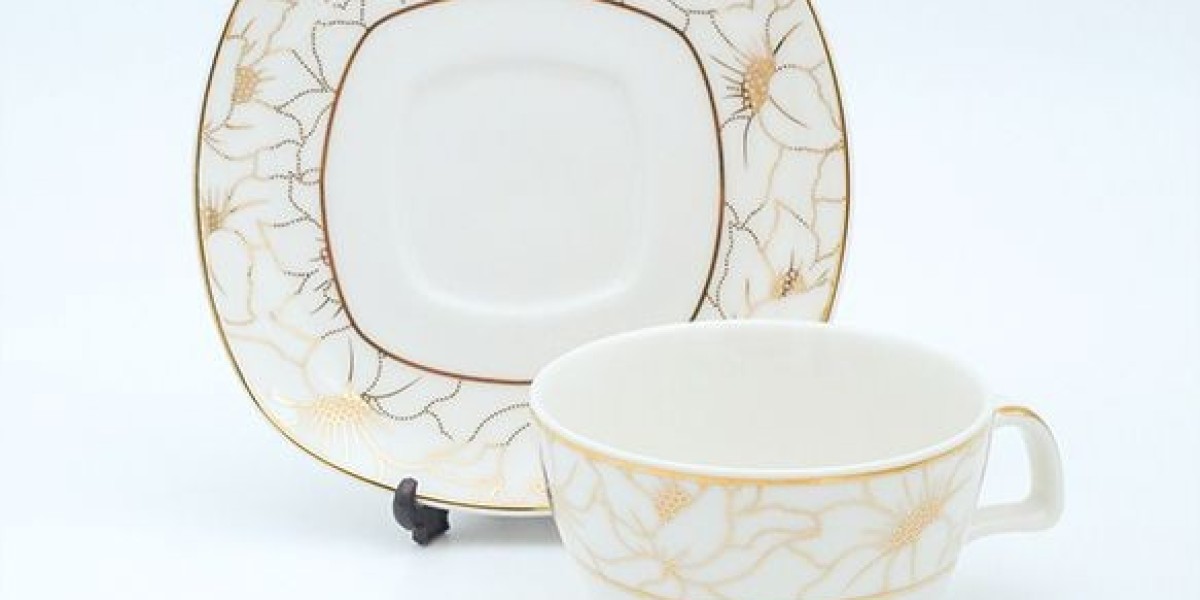Porcelain dinnerware refers to dishes, bowls, plates, and other tableware like the best drinkware sets made from porcelain, a type of ceramic material known for its strength, smoothness, and translucent quality. Porcelain is highly prized for its delicate appearance, yet it is surprisingly durable and resistant to chipping, and makes the best housewarming gifts, employee gifts and corporate gifts in Sri Lanka.
Characteristics of Porcelain Dinnerware:
- Strength and Durability: Porcelain is fired at very high temperatures, making it resistant to chipping and breakage.
- Non-porous Surface: It has a smooth, non-porous surface that resists staining and is easy to clean.
- Translucency: When held up to light, some porcelain pieces appear slightly translucent.
- Heat and Chemical Resistance: Porcelain can handle high temperatures, making it suitable for microwaves, ovens, and dishwashers.
How Porcelain Dinnerware is Made:
- Raw Materials: The main ingredients for porcelain are kaolin clay, feldspar, and quartz. Kaolin gives porcelain its fine texture, feldspar adds durability, and quartz contributes to its strength.
- Shaping: The raw materials are mixed into a paste or slurry, then shaped into dinnerware items using various methods such as casting, pressing, or throwing on a potter's wheel.
- Drying: After the pieces are formed, they are dried to remove excess moisture. This ensures the shape remains intact during firing.
- Bisque Firing: The dried pieces undergo a bisque firing at a lower temperature, around 1,000°C (1,832°F). This initial firing hardens the clay enough for handling.
- Glazing: A layer of glaze, which gives porcelain its shiny, smooth surface, is applied to the bisque-fired pieces. The glaze also seals the porcelain, making it non-porous.
- Final Firing: After glazing, the dinnerware is fired again at a higher temperature, typically between 1,200°C and 1,400°C (2,192°F to 2,552°F). This process, called the glaze firing, vitrifies the porcelain, meaning it becomes glass-like and fully hardened.
- Finishing Touches: Some porcelain pieces are hand-painted or decorated after the final firing, and may go through an additional firing process to set the decorations.
The result is strong, elegant dinnerware that can last for many years with proper care. Porcelain is used in both casual and fine dining settings because of its versatility and aesthetic appeal.
The beauty, hygiene and durability of porcelain dinnerware
Porcelain dinnerware is highly valued for its beauty, hygiene, and durability. These qualities make it a popular choice for both casual and formal dining settings. Here is an overview of each aspect:
- Beauty of Porcelain Dinnerware:
- Elegance: Porcelain's fine texture and smooth finish give it a refined and elegant appearance. It can range from classic white to intricately decorated with various patterns and colours.
- Translucency: High-quality porcelain often has a slight translucency, adding a delicate and sophisticated aesthetic, particularly when thin pieces are held up to the light.
- Versatility in Design: Porcelain can be moulded into various shapes and decorated with different glazes, patterns, or hand-painting. This makes it suitable for a range of styles, from minimalist and modern to ornate and traditional.
- Glossy Surface: The glazed surface of porcelain reflects light, enhancing its overall appeal on the dining table, especially when used for formal settings.
- Hygiene of Porcelain Dinnerware:
- Non-Porous Surface: The glazing process makes porcelain dinnerware non-porous, meaning it does not absorb liquids, food particles, or bacteria. This feature enhances its hygienic qualities, as it is easier to clean and less likely to harbour contaminants.
- Stain Resistance: Due to its smooth, sealed surface, porcelain resists staining from foods and beverages like coffee, wine, or tomato-based dishes.
- Easy to Clean: Its smooth surface makes it simple to wipe or wash by hand or in a dishwasher without leaving residues. Porcelain dinnerware is also resistant to strong detergents and cleaning agents.
- Durability of Porcelain Dinnerware:
- Strength: Although it appears delicate, porcelain is one of the strongest ceramic materials, largely due to the high-temperature firing process. This makes it resistant to chipping and breakage under normal use.
- Heat Resistance: Porcelain can withstand high temperatures, making it safe for use in microwaves, ovens, and dishwashers without the risk of cracking or damage. Its thermal stability allows it to hold up well in a range of cooking and serving environments.
- Longevity: Properly cared for, porcelain dinnerware can last for many years without losing its beauty or structural integrity, making it a worthwhile investment.
- Scratch Resistance: The glazed surface also helps protect porcelain from scratches caused by utensils, which can occur with other types of dinnerware.
Porcelain dinnerware is a perfect blend of aesthetic appeal, hygienic safety, and long-lasting durability, making it ideal for both everyday meals and special occasions.
How to choose good porcelain dinnerware
Choosing good porcelain dinnerware requires attention to several key factors, including quality, design, durability, and functionality. Here is a guide to help you make an informed decision:
- Check the Quality of the Porcelain
- Translucency: Hold the porcelain piece up to the light. Fine porcelain often has a slight translucency, which indicates its purity and high quality.
- Smooth Finish: Inspect the surface of the dinnerware. Good porcelain should have a smooth, glass-like finish without any rough patches, bubbles, or imperfections.
- Sound Test: Lightly tap the edge of a plate or bowl with your fingernail. High-quality porcelain produces a clear, bell-like sound, while lower-quality pieces might sound dull.
- Consider the Durability
- Firing Process: Check if the dinnerware has been fired at high temperatures. This enhances strength and durability, making it less prone to chipping and cracking. Most manufacturers provide information on the firing process.
- Dishwasher and Microwave Safety: Look for porcelain dinnerware labelled as dishwasher- and microwave-safe if you plan to use these appliances. While most porcelain can handle heat, some decorated or delicate pieces may not be suitable for these uses.
- Select the Right Design and Style
- Classic vs. Modern: Choose a design that complements your personal style and your home’s aesthetic. Classic white porcelain is timeless and versatile, fitting well in both casual and formal settings. Modern designs may feature unique shapes, patterns, or colours.
- Pattern Longevity: If the dinnerware has decorations or patterns, consider how they will hold up over time. Hand-painted designs may be more delicate, while printed patterns applied under the glaze are usually more durable and resistant to wear.
- Stacking and Storage: Look for pieces that stack easily to save space in your cupboards. Also, check if the design allows for convenient stacking without risking scratches or damage.
- Examine the Weight
- Balance Between Lightweight and Sturdy: Good porcelain is strong but not too heavy. If the pieces are excessively light, they may be fragile, while overly heavy pieces might be cumbersome to handle. Look for a balance that feels comfortable to use daily.
- Size and Shape of the Dinnerware
- Practicality: Make sure the sizes of the plates, bowls, and cups suit your everyday needs. Larger plates might be ideal for serving meals, while smaller ones can be useful for appetizers or desserts.
- Functional Shapes: Look at the shape of the bowls and plates—are they designed for practical use? For example, deeper bowls may be better for soups and pastas, while flatter plates are ideal for main courses.
- Number of Pieces in a Set
- Completeness: Decide on the number of place settings you need. A typical porcelain dinnerware set includes dinner plates, salad plates, bowls, and mugs. Make sure the set has enough pieces to cover your family’s needs, plus extras for guests.
- Expandable Set: Consider whether the brand offers additional pieces or open-stock items so you can expand your set over time (e.g., serving dishes, platters, or replacement pieces).
- Consider the Brand and Reputation
- Established Brands: Go for established manufacturers with a good reputation for producing high-quality porcelain dinnerware. Brands like Noritake, Royal Doulton, Wedgwood, and Villeroy & Boch are known for their craftsmanship and durability.
- Warranty or Guarantees: Some high-end manufacturers offer warranties on their dinnerware, which can give you peace of mind in case of defects or damages during shipping.
- Budget and Value
- Price vs. Quality: Porcelain dinnerware comes in a wide range of prices, from affordable options to luxury sets. While it may be tempting to go for cheaper options, investing in mid-range to higher-end pieces often pays off in terms of durability and aesthetic appeal.
- Long-Term Investment: Consider how long the dinnerware will last. High-quality porcelain may come with a higher price tag, but its durability and timeless appeal often make it a worthwhile investment that can last for years.
- Test for Scratch and Chip Resistance
- Resistant to Utensil Marks: Some dinnerware is more prone to showing marks from metal utensils. Check for reviews or ask the seller if the set you are considering is resistant to scratches and marks.
- Chip Resistance: Look for information on how well the edges hold up to everyday use. Strong, well-made porcelain should be chip-resistant under normal conditions.
By keeping these factors in mind, you can select porcelain dinnerware that is not only beautiful but also durable and practical for your needs.







